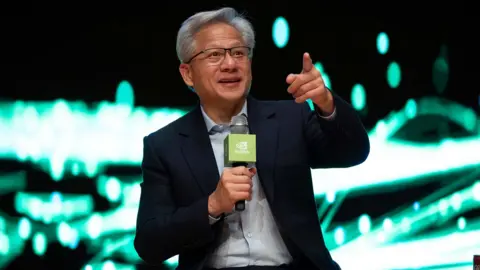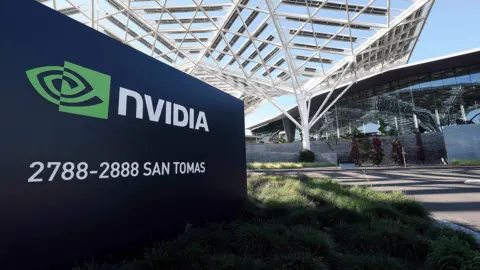Daniel KayBusiness reporter
 Getty Images
Getty ImagesChip giant Nvidia reported better-than-expected earnings, easing investors' fears about heavy artificial intelligence (AI) spending that has rattled markets.
The company said revenue jumped 62% to $57 billion in the three months to October, driven by demand for its chips used in artificial intelligence data centers. Sales of this division grew by 66% and exceeded $51 billion.
Fourth-quarter sales forecasts in the $65 billion range also topped forecasts, sending Nvidia shares up about 4% in after-hours trading.
“There has been a lot of talk about the AI bubble. From our perspective, we see something completely different,” said Chief Executive Jensen Huang.
In a statement, Mr. Huang said sales of his Blackwell artificial intelligence systems are “off the charts” and that “cloud GPUs [graphics processing units] sold out.”
“We succeed at every stage of AI development.”
Nvidia, the world's most valuable company, makes chips that are critical to artificial intelligence data centers and is considered a leader in the artificial intelligence boom.
Its latest results have drawn even more attention than usual on Wall Street amid growing concerns that AI stocks are overvalued – concerns that could persist despite the blockbuster results.
Those concerns sparked four consecutive daily declines in the S&P 500 leading up to Wednesday as questions arise about the returns on AI investments. The benchmark index fell nearly 3% in November.
Some analysts have compared the rise of AI stocks to the dot-com boom of the late 1990s. This led to a surge in the value of early Internet companies on a wave of optimism about the then-new technology, before the bubble burst in early 2000.
This collapse in stock prices led to the bankruptcy of some companies and also hit the value of people's savings, including their pension funds.
Nvidia's performance bar was high.
Adam Turnquist, chief technical strategist at LPL Financial, said the question isn't whether the company will exceed expectations, but “by how much.”
Matt Britzman, senior equity analyst at Hargreaves Lansdown, said: “While AI valuations dominate news feeds, Nvidia is running its business in style.”
He said valuations in some areas of the AI sector “need a breather, but Nvidia is not in that camp.”
Huang previously said he expected orders for artificial intelligence chips worth $500 billion before next year. Investors were asking for details about when the company expects to receive those earnings and how it plans to fulfill orders.
Colette Kress, Nvidia's chief financial officer, told analysts that the company will “likely” take on more orders beyond the $500 billion already announced.
But she also expressed frustration over regulatory restrictions that limit the company's ability to export its chips to China, saying the U.S. “must get the support of every developer,” including those in China.
She said Nvidia is “committed to continuing to collaborate” with the U.S. and Chinese governments.
Earlier on Wednesday at the US-Saudi Investment Forum in Washington, Mr Huang joined Elon Musk to announce the creation of a huge data center complex in Saudi Arabia, the first customer of which will be Musk's artificial intelligence company xAI.
The plant will be equipped with hundreds of thousands of Nvidia chips.
The Wall Street Journal reported that the US Commerce Department has approved the sale of up to 70,000 advanced artificial intelligence chips to state-backed companies in Saudi Arabia and the United Arab Emirates, reversing an earlier decision.
The agreement follows talks between US President Donald Trump and Saudi Arabia's Crown Prince Mohammed bin Salman, who visited the White House this week.
 Environmental Protection Agency/Shutterstock
Environmental Protection Agency/ShutterstockTech titans are increasing their AI spending as they rush to reap the benefits of a boom that has pushed stocks to record highs.
Earnings reports from Meta, Alphabet and Microsoft last month confirmed enormous amounts of money these firms are spending money on everything from data centers to chips.
Sundar Pichai, head of Google's parent company Alphabet, told the BBC that while the rise in investment in AI was an “extraordinary moment”, there was some “irrationality” in the current AI boom. His comments come amid other warnings from industry leaders.
Simon French, chief economist at Panmure Liberum, said there were some parallels with the dot-com bubble 25 years ago.
“The problem is not so much with large cash-generating companies like Nvidia, but with the wider technology ecosystem, much of which is currently unprofitable,” he told the BBC's Today programme.
Nvidia is at the center of a network of deals between key AI players such as OpenAI, Anthropic and xAI.
The deals have drawn scrutiny due to their cyclical nature as artificial intelligence companies increasingly invest in each other. Agreements include Investment of $100 billion in OpenAIthe company behind ChatGPT.
Eileen Burbidge, technology investor and founding partner of Passion Capital, told the Today program: “A lot of the skepticism or anxiety about the bubble is fueled by the fact that there are a lot of round-robin deals going on where Nvidia commits to investing in a company, which in turn commits to invest in Nvidia or commits to buying Nvidia chips.
“So it goes around in circles, maybe with one or two other people within the circle, but yeah, there seems to be about 10 to 20 companies doing these deals back and forth.”
Additional reporting by Lily Jamali, North America technology correspondent in San Francisco.









